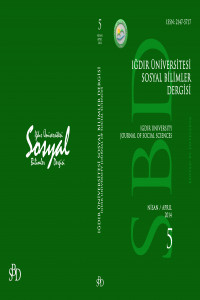Öz
Felsefe tarihi boyunca, ‘İlk Öğretmen’ Aristoteles’in Metafizik adlı eseri hem Batıda hem de Doğuda saygın bir yer edinmiş ve pek çok filozof tarafından kimi bölümüne şerhler ve kısa açıklamalar yazılmıştır. Bu filozoflardan biri de hiç kuşkusuz Doğuda ‘İkinci Öğretmen’ diye bilinen Fârâbî’dir. Aristoteles’in İslâm dünyasında en iyi biçimde anlaşılması için çaba göstermiş olan Fârâbî, büyük filozofun birçok eserine açıklama ve şerh yazdığı gibi, telif eserlerinde de Aristoteles’in otoritesine saygı göstermiş ve onun yolunu izlemeye çabalamıştır. Elinizdeki makalede, Fârâbî, Aristoteles’in Metafizik eserindeki amaçlarının ve bu eserin konularının ne olduğunu anlatmakta, ayrıca metafizik bilimine neden teoloji denildiğini ve teoloji ile kelâm bilimi arasındaki farkı kısaca açıklamaya çalışmaktadır.
Anahtar Kelimeler
Aristoteles Fârâbî metafizik teoloji tümel bilim tikel bilim ilke.
Öz
During the history of philosophy, the work Metaphysics by Aristotle, the ‘First Master’, has been obtained the esteemed position in the West and the East, and it has been written commentaries and synopses by many philosophers to its some chapters. One of them is certainly al-Farabi, known as the ‘Second Master’ in the East. Al-Farabi, who has endeavored to be understood ideally about Aristotle in Islamic world, has shown reverence in his original works for Aristotle’s authority and made effort to follow him as well as written commentaries and synopses for several works of the great philosopher. In present treatise, al-Farabi explains what Aristotle’s aims in the book Metaphysics and what subjects of this book are, in addition, he tries to briefly clear why science metaphysics is called theology and what distinction between metaphysics and science kalam is.
Anahtar Kelimeler
Aristotle al-Farabi metaphysics theology universal science particular science principle.
Ayrıntılar
| Birincil Dil | Türkçe |
|---|---|
| Bölüm | Araştırma Makalesi |
| Yazarlar | |
| Yayımlanma Tarihi | 1 Nisan 2014 |
| Yayımlandığı Sayı | Yıl 2014 Sayı: 5 |

